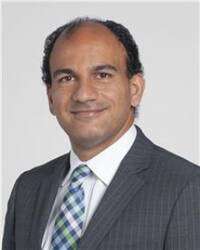
14 Apr Study Finds Obese Medicare Patients Benefit From Bariatric Surgery
MedicalResearch.com Interview with:
 Amgad Mentias, MD MS FACC FESC
Amgad Mentias, MD MS FACC FESC
Assistant Professor, CCLCM
Section of Clinical Cardiology, Heart and Vascular Institute.
Cleveland, OH 44195
MedicalResearch.com: What is the background for this study?
Response: There is evidence that bariatric or weight loss surgery can decrease the risk of heart attack, stroke, and death in young and middle age patients with obesity and diabetes. However, the evidence is less clear for older patients and patients without diabetes. There is also no long-term data on outcomes of bariatric surgery in the Medicare beneficiaries.
So, in our study, we aimed to report long-term outcomes of bariatric surgery from a contemporary nationwide cohort from the US, while also looking into outcomes in patients older than 65 years, and patients without type 2 diabetes specifically.
MedicalResearch.com: What are the main findings?
Response: We found that bariatric surgery in Medicare beneficiaries with obesity, regardless of having diabetes or not, was associated with significant lower risk of death, heart attack, new onset heart failure, and stroke in follow up. These results were consistent in patients younger than 65 years, as well as in patients 65 to 75 years old. They were also consistent in patients with and patients without diabetes.
MedicalResearch.com: What should readers take away from your report?
Response: Medical providers should discuss with their patients with obesity the option of bariatric surgery even if they are older than 65 years or they do not have diabetes, as long as they are good surgical candidates. Findings of this study indicate the health consequences of obesity on cardiovascular system is reversible. If we help patients to lose large amount of weight and keep the weight off for a long period of time, we can decrease the risk of heart attack, heart failure, stroke, and death.
MedicalResearch.com: What recommendations do you have for future research as a result of this work?
Response: New medications such as glucagon like peptide analogues are showing promising results in weight loss, although not to the extent which is achieved by bariatric surgery. It is important to do comparison in outcomes between bariatric surgery vs. newer weight loss medications. It is also important to define the safety and effectiveness of bariatric surgery in sicker patients with history of heart failure.
MedicalResearch.com: Is there anything else you would like to add?
Response: I would like to emphasize the magnitude of effects of bariatric surgery in this study which was extremely large. Bariatric surgery could decrease the risk of new heart failure by 54%, risk of heart attack by 37%, risk of stroke by 29%, and risk of dying by 37% in Medicare beneficiaries with obesity compared with usual nonsurgical care.
I do not have any disclosures.
Citation:
Amgad Mentias, Ali Aminian, Dalia Youssef, Ambarish Pandey, Venu Menon, Leslie Cho, Steven E. Nissen, Milind Y. Desai,
Long-Term Cardiovascular Outcomes After Bariatric Surgery in the Medicare Population,
Journal of the American College of Cardiology,
Volume 79, Issue 15, 2022,
Pages 1429-1437, ISSN 0735-1097,
https://doi.org/10.1016/j.jacc.2022.01.047
[wysija_form id=”3″]
[last-modified]
The information on MedicalResearch.com is provided for educational purposes only, and is in no way intended to diagnose, cure, or treat any medical or other condition. Always seek the advice of your physician or other qualified health and ask your doctor any questions you may have regarding a medical condition. Some links may be sponsored and no links are warranted or endorsed by MedicalResearch.com or its parent company, Eminent Domains Inc. In addition to all other limitations and disclaimers in this agreement, service provider and its third party providers disclaim any liability or loss in connection with the content provided on this website.
Last Updated on April 14, 2022 by Marie Benz MD FAAD
